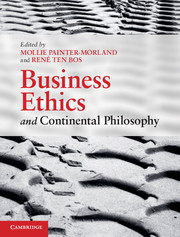Book contents
- Frontmatter
- Contents
- Figures
- Boxes
- Contributors
- Foreword
- Acknowledgements
- Introduction: critical crossings
- 1 Agency in corporations
- 2 Stakeholder theory
- 3 Organizational culture
- 4 Enron narrative
- 5 Moral decision-making
- 6 Organizational justice
- 7 Reward, incentive, and compensation
- 8 Leadership
- 9 Whistle-blowing
- 10 Marketing, bad faith, and responsibility
- 11 Corporate social responsibility
- 12 Corporate responsibility standards
- 13 Sustainability
- 14 Globalization
- Glossary
- Name index
- Subject index
- References
9 - Whistle-blowing
Published online by Cambridge University Press: 05 June 2012
- Frontmatter
- Contents
- Figures
- Boxes
- Contributors
- Foreword
- Acknowledgements
- Introduction: critical crossings
- 1 Agency in corporations
- 2 Stakeholder theory
- 3 Organizational culture
- 4 Enron narrative
- 5 Moral decision-making
- 6 Organizational justice
- 7 Reward, incentive, and compensation
- 8 Leadership
- 9 Whistle-blowing
- 10 Marketing, bad faith, and responsibility
- 11 Corporate social responsibility
- 12 Corporate responsibility standards
- 13 Sustainability
- 14 Globalization
- Glossary
- Name index
- Subject index
- References
Summary
Goals of this chapter
After studying this chapter you will be able to:
understand the moral ambiguity surrounding whistle-blowing practices;
understand the differences in the way the US and Europe perceive and deal with whistle-blowing;
understand Caputo's description of obligations;
understand Bauman's description of the moral impulse;
understand Jonas's idea of a shared ethics.
Introduction
Whistle-blowing has become an increasingly important issue in business ethics in recent years. In business ethics, as in sporting events, whistle-blowing is related to sounding an alert that the rules of the game have been broken. But unlike the referee in a football game, the person blowing the whistle in the case of corporations is not an objective, independent observer, but rather an employee or a stakeholder who reports the misconduct of a colleague or of the corporation as a whole. Whistleblowers are individuals who believe that there is a risk of grave harm if unethical behaviour is not brought to light. And in fact, the collapses of both Enron and WorldCom around the turn of the century made it quite clear what harm can result from unethical behaviour. In both the WorldCom and Enron cases, the whistleblowers were employees of the organization, and as it happens, they were both female. Sherron Watkins (Enron) and Cynthia Cooper (WorldCom) both did much to bring the dilemmas that whistleblowers face into the public realm. Though they could not prevent their corporations’ collapse, both were hailed as public heroes for their attempts to blow the whistle internally and for their strength of character in exposing their corporations’ misconduct. They both believed that in reporting their suspicions of misconduct, they acted in the interests of their corporations and their stakeholders.
- Type
- Chapter
- Information
- Business Ethics and Continental Philosophy , pp. 199 - 219Publisher: Cambridge University PressPrint publication year: 2011
References
- 1
- Cited by



